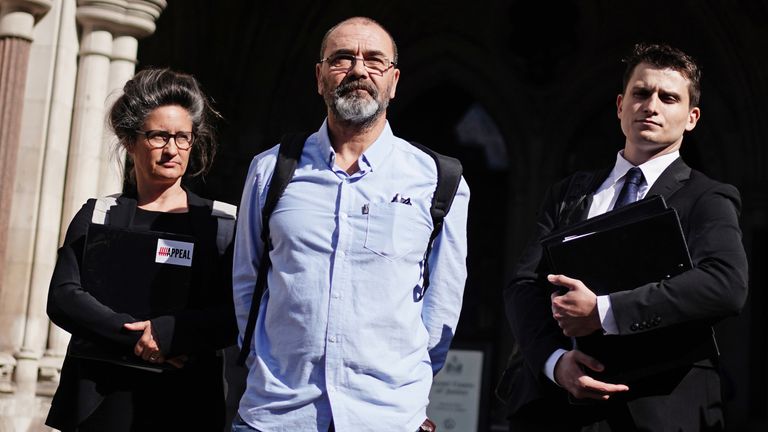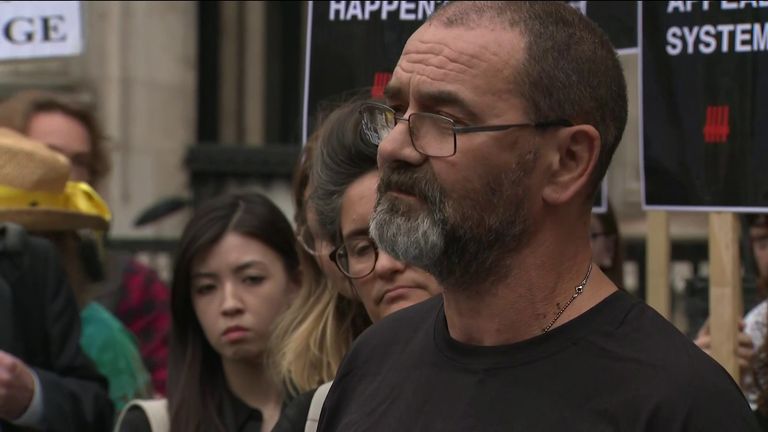There should be an inquiry into the “total public mess” caused by a miscarriage of justice that led to an innocent man spending 17 years in prison for a rape he did not commit, a former solicitor general has said.
Lord Edward Garnier KC told Sky News that the case of Andrew Malkinson was “astonishing” and “gets more astonishing pretty well by the week”.
He said it was a “terribly bad and shocking case and we should be ashamed of what has happened”.
A public inquiry needs to report within six months and be led by someone of “considerable stature and independence”, Lord Garnier added.
Mr Malkinson had his conviction quashed last month after DNA linking another man to the crime was produced.
Case files obtained by the 57-year-old and seen by Sky News show that prosecutors knew in 2007 that forensic testing had identified a searchable male DNA profile on the rape victim’s top that did not match his.
The documents show that DNA in saliva, from an unidentified male, was found on the victim’s vest near a bite wound her attacker inflicted.
A meeting was held between police, prosecutors and forensic scientists.
A Crown Prosecution Service caseworker said: “If it is assumed that the saliva came from the offender, then it does not derive from Malkinson.
“This is surprising because the area of the clothing that the saliva was recovered from was crime specific.”
At that point, Mr Malkinson could have had his case referred to the Court of Appeal by the Criminal Cases Review Commission (CCRC).
But the CCRC concluded: “Just because it appears there is someone else’s DNA on the complainant’s vest … cannot surely produce a hope of a successful referral in view of all the other strong ID evidence – and the case was really based on the ID evidence which has been approved by the Court of Appeal.”
That comment was made on 24 August 2009. On 14 July 2010, a CCRC worker wrote: “My view is that there is nothing to be gained by having any of the DNA exhibits re-tested yet again.
“This is because, as stated above, the ID evidence from the victim and the two witnesses is forceful and, in any event, the jury was told that there was no DNA evidence that could help them.”
Another comment, later that month, says the “only meaningful review would be by a forensic provider which would be expensive, and I do not think on the basis of the material available that it would be a reasonable course of action”.
Read more:
Andrew Malkinson ‘won’t have to repay prison living costs’
Unfair for wrongfully convicted inmates to pay back prison board and lodging costs, Rishi Sunak says
Lord Ken Macdonald, a former director of public prosecutions, said identification evidence can be “so often mistaken”.
He told Sky News: “If you have evidence that is inconsistent with identification evidence, it’s absolutely the first rule that you investigate that evidence carefully, thoroughly, rigorously, precisely because witnesses are so often – bitter experience had shown – so often mistaken.”
Regarding his call for a public inquiry, Lord Garnier said “somebody of considerable stature and independence needs to unravel all this”.
He added that they need to give “recommendations about the future of the CCRC and its management and its resourcing, about the conduct of Greater Manchester Police and the conduct of the Crown Prosecution Service in relation to this particular case”.
A Crown Prosecution Service spokesperson said: “It is clear Mr Malkinson was wrongly convicted of this crime and we share the deep regret that this happened.
“Evidence of a new DNA profile found on the victim’s clothing in 2007 was not ignored. It was disclosed to the defence team representing Mr Malkinson for their consideration.
“In addition, searches of the DNA databases were conducted to identify any other possible suspects. At that time there were no matches and therefore no further investigation could be carried out.”


